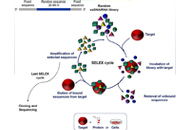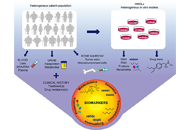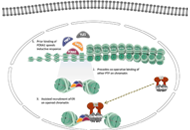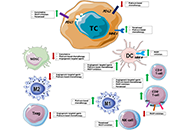Aptamers and antibodies: rivals or allies in cancer targeted therapy?
The goal of an efficacious cancer therapy is to specifically target diseased cells at high accuracy while sparing normal, healthy cells. Over the past three decades, immunotherapy, based on the use
[...] Read more.
The goal of an efficacious cancer therapy is to specifically target diseased cells at high accuracy while sparing normal, healthy cells. Over the past three decades, immunotherapy, based on the use of monoclonal antibodies (mAbs) directed against tumor-associated antigens, to inhibit their oncogenic function, or against immune checkpoints, to modulate specific T cell responses against cancer, has proven to be an important strategy for cancer therapy. Nevertheless, the number of mAbs approved for clinical use is still limited because of significant drawbacks to their applicability. Oligonucleotide aptamers, similarly to antibodies, form high-affinity bonds with their specific protein targets, thus representing an effective tool for active cancer targeting. Compared to antibodies, aptamers’ use as therapeutic agents benefits from their low size, low/no immunogenicity, simple synthesis and design flexibility for improving efficacy and stability. This review intends to highlight recently emerged applications of aptamers as recognition elements, from biomarker discovery to targeted drug delivery and targeted treatment, showing aptamers’ potential to work in conjunction with antibodies for attacking cancer from multiple flanks.
Lisa Agnello ... Laura Cerchia
The goal of an efficacious cancer therapy is to specifically target diseased cells at high accuracy while sparing normal, healthy cells. Over the past three decades, immunotherapy, based on the use of monoclonal antibodies (mAbs) directed against tumor-associated antigens, to inhibit their oncogenic function, or against immune checkpoints, to modulate specific T cell responses against cancer, has proven to be an important strategy for cancer therapy. Nevertheless, the number of mAbs approved for clinical use is still limited because of significant drawbacks to their applicability. Oligonucleotide aptamers, similarly to antibodies, form high-affinity bonds with their specific protein targets, thus representing an effective tool for active cancer targeting. Compared to antibodies, aptamers’ use as therapeutic agents benefits from their low size, low/no immunogenicity, simple synthesis and design flexibility for improving efficacy and stability. This review intends to highlight recently emerged applications of aptamers as recognition elements, from biomarker discovery to targeted drug delivery and targeted treatment, showing aptamers’ potential to work in conjunction with antibodies for attacking cancer from multiple flanks.
 Aptamers and antibodies: rivals or allies in cancer targeted therapy?Open AccessReviewThe goal of an efficacious cancer therapy is to specifically target diseased cells at high accuracy while sparing normal, healthy cells. Over the past three decades, immunotherapy, based on the use [...] Read more.Lisa Agnello ... Laura CerchiaPublished: February 28, 2021 Explor Target Antitumor Ther. 2021;2:107–121
Aptamers and antibodies: rivals or allies in cancer targeted therapy?Open AccessReviewThe goal of an efficacious cancer therapy is to specifically target diseased cells at high accuracy while sparing normal, healthy cells. Over the past three decades, immunotherapy, based on the use [...] Read more.Lisa Agnello ... Laura CerchiaPublished: February 28, 2021 Explor Target Antitumor Ther. 2021;2:107–121 Multi-omics tumor profiling technologies to develop precision medicine in multiple myelomaOpen AccessReviewMultiple myeloma (MM), the second most common hematologic cancer, is caused by accumulation of aberrant plasma cells in the bone marrow. Its molecular causes are not fully understood and its great h [...] Read more.Sara Ovejero, Jerome MoreauxPublished: February 28, 2021 Explor Target Antitumor Ther. 2021;2:65–106
Multi-omics tumor profiling technologies to develop precision medicine in multiple myelomaOpen AccessReviewMultiple myeloma (MM), the second most common hematologic cancer, is caused by accumulation of aberrant plasma cells in the bone marrow. Its molecular causes are not fully understood and its great h [...] Read more.Sara Ovejero, Jerome MoreauxPublished: February 28, 2021 Explor Target Antitumor Ther. 2021;2:65–106 Immunotherapy in gynecological cancersOpen AccessReviewImmunotherapy has changed the natural history of several malignancies that, a decade ago, had a very poor prognosis, such as lung cancer and melanoma. Consequently, many attempts have been done to e [...] Read more.Domenica Lorusso ... Giovanni ScambiaPublished: February 28, 2021 Explor Target Antitumor Ther. 2021;2:48–64
Immunotherapy in gynecological cancersOpen AccessReviewImmunotherapy has changed the natural history of several malignancies that, a decade ago, had a very poor prognosis, such as lung cancer and melanoma. Consequently, many attempts have been done to e [...] Read more.Domenica Lorusso ... Giovanni ScambiaPublished: February 28, 2021 Explor Target Antitumor Ther. 2021;2:48–64 Non-invasive detection of epithelial mesenchymal transition phenotype and metastatic dissemination of lung cancer by liquid biopsyOpen AccessReviewThe occurrence of phenotype switch from an epithelial to a mesenchymal cell state during the activation of the epithelial mesenchymal transition (EMT) program in cancer cells has been closely associ [...] Read more.Viviana De Rosa ... Francesca IommelliPublished: February 28, 2021 Explor Target Antitumor Ther. 2021;2:36–47
Non-invasive detection of epithelial mesenchymal transition phenotype and metastatic dissemination of lung cancer by liquid biopsyOpen AccessReviewThe occurrence of phenotype switch from an epithelial to a mesenchymal cell state during the activation of the epithelial mesenchymal transition (EMT) program in cancer cells has been closely associ [...] Read more.Viviana De Rosa ... Francesca IommelliPublished: February 28, 2021 Explor Target Antitumor Ther. 2021;2:36–47 Emerging role of pioneer transcription factors in targeted ERα positive breast cancerOpen AccessReviewTranscription factors (TFs) are modular protein groups that preferably bind to DNA sequences and guide genomic expression through transcription. Among these key regulators, “pioneer facto [...] Read more.Honey Pavithran, Ranjith KumavathPublished: February 28, 2021 Explor Target Antitumor Ther. 2021;2:26–35
Emerging role of pioneer transcription factors in targeted ERα positive breast cancerOpen AccessReviewTranscription factors (TFs) are modular protein groups that preferably bind to DNA sequences and guide genomic expression through transcription. Among these key regulators, “pioneer facto [...] Read more.Honey Pavithran, Ranjith KumavathPublished: February 28, 2021 Explor Target Antitumor Ther. 2021;2:26–35 Old but gold: the role of drug combinations in improving response to immune check-point inhibitors in thoracic malignancies beyond NSCLCOpen AccessReviewThe introduction of immune checkpoint inhibitors (ICIs) in non-oncogene addicted non-small cell lung cancer (NSCLC) has revolutionized the treatment scenario and led to a meaningful improvement in p [...] Read more.Luca Cantini ... Rossana BerardiPublished: February 28, 2021 Explor Target Antitumor Ther. 2021;2:1–25
Old but gold: the role of drug combinations in improving response to immune check-point inhibitors in thoracic malignancies beyond NSCLCOpen AccessReviewThe introduction of immune checkpoint inhibitors (ICIs) in non-oncogene addicted non-small cell lung cancer (NSCLC) has revolutionized the treatment scenario and led to a meaningful improvement in p [...] Read more.Luca Cantini ... Rossana BerardiPublished: February 28, 2021 Explor Target Antitumor Ther. 2021;2:1–25